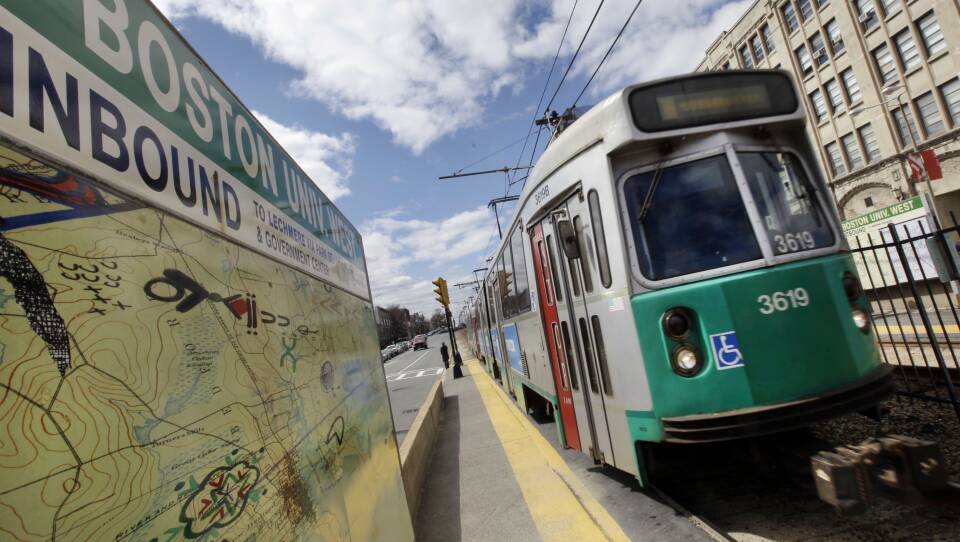The project to extend the MBTA's Green Line into Somerville and Medford is in deep trouble, the transit agency revealed Monday.
The project is threatened by what could amount to an estimated $1.08 billion in cost overruns, the MBTA's Fiscal Management and Control Board was told.
The budget used to determine how the federal government and state would split the cost of the massive project assumed that the next step in the extension process would cost just under $500,000. But the bid for the work comes in at almost a full $1 billion Massachusetts would have to pay for itself.
MassDOT and the Baker administration now peg the cost of the entire project at well over the initial $1.992 billion and assume it will end up costing between $2.7 and $3 billion to finish the project.
State transportation officials, including the board hand-picked by Gov. Charlie Baker, will now have to decide whether to go through with the Green Line Extension project or if it can't be saved with cost mitigation efforts. The project could be massively scaled back in order to complete a more modest extension within the set budget; new, cheaper bids could be sought or some other funding method could be found.
Another wrinkle in the Commonwealth's willingness to fund the project is where the state's side of the money will come from: Special Obligation Transit Bonds, the same funding source being used to buy much needed new Red and Orange Line cars for the subway. Any unused money from these bonds could be used to improve existing MBTA infrastructure.
The agency floats a number of reasons for the discrepancy, including a more expensive than expected construction market, revised design data, price padding for potential cost overruns and an initial estimate that was simply too low.
The project is to include new Green Line cars, 4.5 miles of new track and six new stations. To do that, engineers need to move four miles of Commuter Rail track, relocate Lechmere Station and complete dozens of other projects to make way for new tracks.
Government Center Station Glass Fogs Up, Needs To Be Replaced
The news that the Somerville Green Line extension is facing a possible $1 billion cost overrun wasn't the only downer at Monday's meeting of the MBTA Fiscal and Management Control Board.
Some or all of the glass for the new Government Center headhouse in Boston is defective and needs to be replaced, the MBTA's General Manager said Monday.
"Fairly soon people will start to see the glass that's been up for several months now removed, and the area covered with tarps to protect the interior from the weather as the glass is sent back to California to be remanufactured and reshipped out and reinstalled," said MBTA General Manager Frank DePaola.
During his comments to the MBTA Fiscal and Management Control Board, DePaola said there is an issue of workmanship in the glass and glazing of the structure now rising out of Government Center Plaza. According to DePaola, seals between panes of glass have failed, allowing moisture to get between them and causing fogginess to appear inside the windows.
DePaola said the project's contractor, Barletta Heavy Division, is fully responsible for workmanship issues and should cover the cost of replacing the panes, which will be done in batches.
"Those double pane windows, those seals have failed," DePaola said. "The inner gas has leaked out and moisture has gotten in, so if you look at many of them closely you'll see fogging on the inside of the window."
All defective glass will have to be replaced, MassDOT spokesman Mike Verseckes told WGBH News after DePaola's remarks, but it's unclear how many of the panels will need to come down. The replacement of the panes will not affect the expected Spring 2016 opening of the station, as Barletta will do the replacement work concurrently with the station's construction, DePaola said.
T Board Hears Plans On Privatizing Bus Routes
Meanwhile, the T is moving forward with possible plans to privatize some bus services for underused routes as a cost-saving measure.
The T is looking for ideas from private companies to improve service on some bus routes and is open to the idea of having a company take over for them entirely on some lines.
The Fiscal Control and Management Board heard plans to offer two formal requests for information on possibly privatizing the T's late night bus service and on some of it's least-used regular routes.
MBTA management has more flexibility to seek private services after the Legislature signed off on a three year moratorium to the state's anti-privatization law as part of efforts to reform the transit agency.
Russell Gittlen, a machinists union representative and member of the MassDOT board of directors urged the panel to try new solutions but to avoid privatization for bus services.
"The bus was the shining star," Gittlen said. "The bus system did do well throughout the winter. So if there's improvements that can be made we're all for it. We have no problem with that."
Managers plan to entertain offers throughout the fall and the control board could decide to pursue a contract for privatization in the spring.





